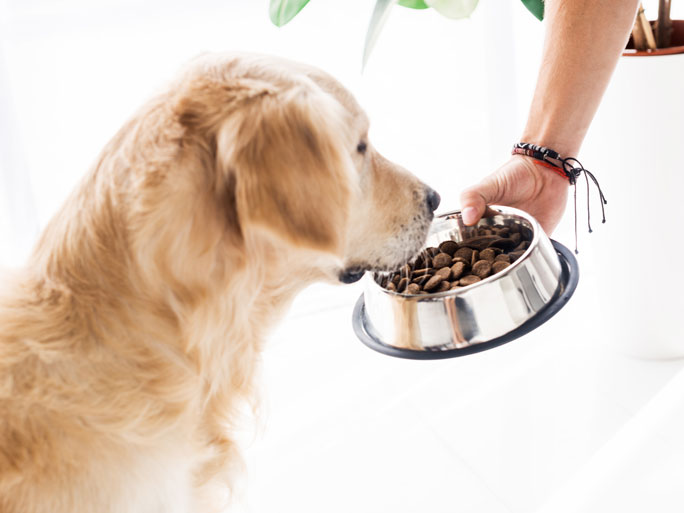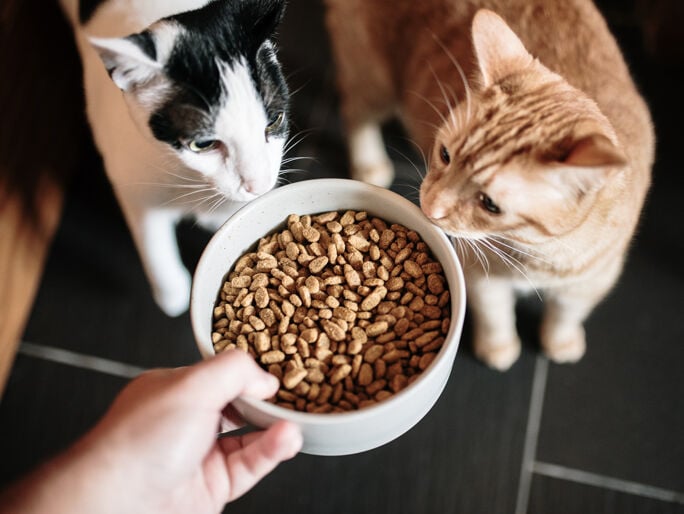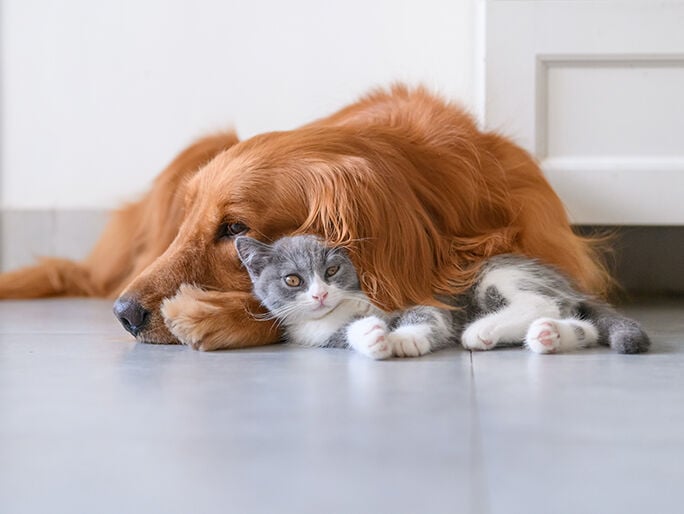manage your pet’s weight
Know the healthy weight for your beloved pet.
Your pet’s weight affects how their entire body works. Extra pounds (even just a little bit for smaller pets) can put your pet at risk for diabetes and other health concerns.

Smart ways to manage your pet’s weight
- Consistent meals
- Lower calorie diets
- Appropriate serving sizes
- Reduce treats
- Avoid table scraps
- Exercise
Healthy pet weights and pet weight-related health issues
A nutritionally balanced diet, portion control, exercise, and fewer treats can help keep your pet's weight in a healthy range.
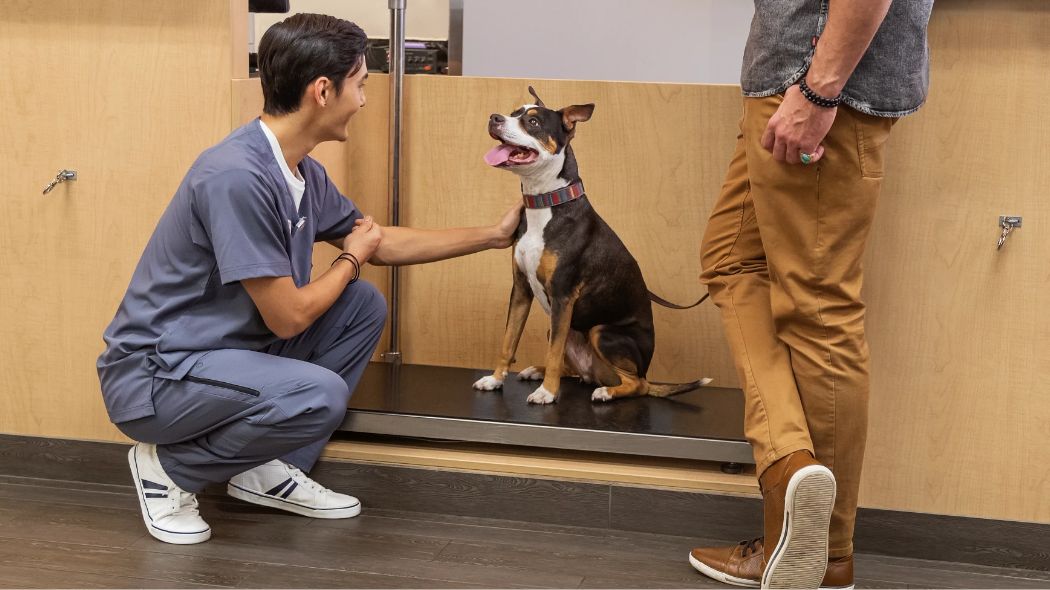
Your pet’s weight affects their overall wellness, health, and energy levels
1 out of 3 pet dogs or cats are considered overweight or obese, making pet obesity an epidemic.
Extra weight can be painful on joints and potentially worsen arthritis in pets. It can also hinder pets from moving frequently to relieve themselves or drink water, which can lead to accidents in the house or other illnesses.
Your pet’s weight affects much more than how they look. A healthy weight helps your pet fend off health issues and fight diseases.
Pets that suddenly or inexplicably gain weight may also be suffering from hormonal imbalances or diseases such as hypothyroidism or Cushing’s disease.
But it’s not only weight gain that’s a concern. Significant weight loss can also indicate a health issue. A pet that is too skinny may not be getting enough nutrients, have a metabolic disease like type 1 diabetes, suffer from parasites, or have other health issues that require veterinary care.
Pet obesity and sudden weight loss can both be signs of diabetes
Obesity is a risk factor for type 2 diabetes. This life-threatening condition occurs when your pet’s insulin levels are unable to regulate their blood sugar. Older and obese pets are especially at risk.
If your pet is older, obese, or shows any signs of diabetes, check with your veterinary team right away.
Banfield’s vets are here to help with diagnosis and management should your pet need it.
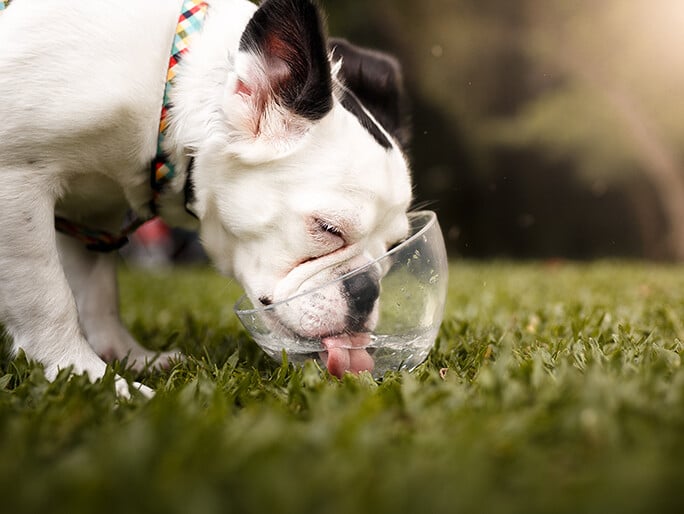
Use visual cues to help weight-check your pet
Don’t think of healthy pet weight as an ideal number on a scale. A healthy weight is different for each pet, so what’s more important is if they have the right amount of padding on their frame for their size and age. Once you and your veterinarian have determined your pet is healthy, you can use their weight to check any changes that may happen.
Take a good look at your pet from the side and above. If your pet needs a weight adjustment, schedule a time to consult your veterinarian.

Very Thin Pet
Severely defined ribs and waist — bony to touch
Thin Pet
Easily visible ribs andwaist

Ideal Weight
Ribs easily felt, butnot seen, with an obvious
waist

Overweight Pet
Ribs not easily seen or felt,the waist might be subtle or
difficult to appreciate

Obese Pet
Ribs not easily seen or felt,with no waist at all or
even a bulge where the waist should be
Weight management for dogs or cats
Does serving a quality diet, using portion control, getting exercise, and skipping snacks sound familiar? That’s because it works for both people and pets!
Proper nutrition and serving sizes help your pet maintain a healthy weight
Always make sure your pet is getting the proper amount of nutrition and the right serving size for their species, age, breed, and activity level.
An easy place to start is by choosing a quality commercial pet food, which will list recommended serving sizes for the ideal weight on the packaging.
Are you feeding your furry friend an alternative pet diet? Consult your veterinarian to make sure you’re hitting your pet’s health goals.
Food and diet tips for obese pets
Your pet’s calorie needs depend on a variety of factors such as age, activity level, and overall health.
While pet food feeding labels have general caloric guidelines you can reference, we also recommend checking in with your vet for your pet’s specific dietary recommendations.
A feeding schedule can help with pet weight loss
Your pet needs a set number of quality calories, but how you split up delivering those calories is up to you. One meal, two meals, or more can all be proper depending on you, your pet, and your family’s lifestyle.
One exception is puppies and kittens! These growing animals need to be fed more often to keep their growing little bodies nourished.
Recommended serving schedule for puppies and kittens
- Meals for puppies and kittens under 3 months old: Feed four times a day, several hours apart, starting in the early morning.
- Puppies and kittens between 3-6 months old: Shift to three meals a day, as they are now able to maintain their nutrient levels longer.
- Puppies and kittens 6 months and older: Serve one meal or split up your pet's daily calories into two meals, depending on what you and your pet prefer.
Why you should keep treats small — and skip the table scraps
Treats can be a happy part of your pet’s quality diet. Just be mindful to avoid piling on calories.
Treats shouldn’t be more than 10% of your pet’s total caloric intake. If you find you’re going over, cut back on treats rather than on your pet’s regular meals — your pet’s body needs daily nutrition far more than it needs a snack and most treats are not as well balanced as the quality pet foods.
Also, try to avoid using table scraps as treats. No matter how much your sweet kitty pleads, or your very good dog begs, even a bite-sized amount of human food is packed with calories that can quickly add up to unhealthy extra pet pounds. It also teaches your pet unhealthy habits that can get them in trouble around others or in your community.
Mindful ways to manage pet treats
- Keep treats small
- Breaking up pet treats in half
- Only give one or two pet treats at a time
- Try low-calorie pet treats
- Use regular dry kibble as a treat
- Use treats only as positive rewards
- Use active food toys
- Use non-food rewards like tummy rubs or their fav pet toy
Exercise is an important part of a healthy pet weight management plan
Exercise can help keep your pet happy and healthy. Ask your veterinary team for suggestions if your BFF has mobility or other health issues — there’s always something the two of you can do.
Exercise for dogs
Walks, playing catch, and hiding snacks in a treat toy they love to nose around are all great options.

Take a walk around the neighborhood.

Go for a swim.

Play fetch.
Exercise for cats
Entice your cat with a jingle ball, feather teaser or other hunter-type toys.
Play with a favorite toy.

Cat trees.

Move the food.

Use food toys.
Mentioned in this article

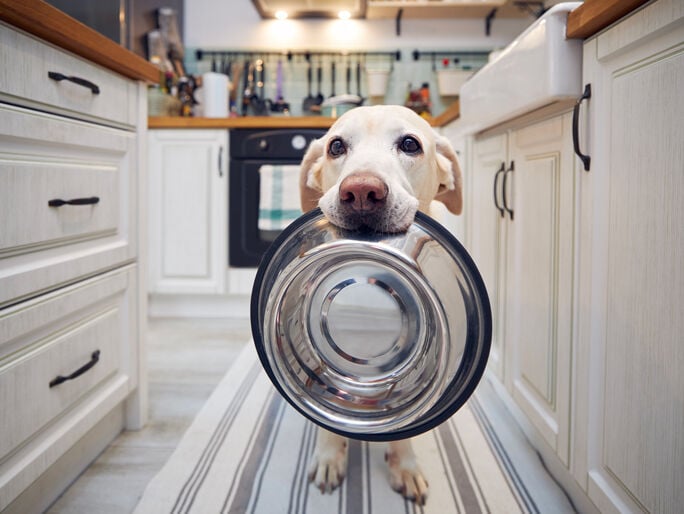
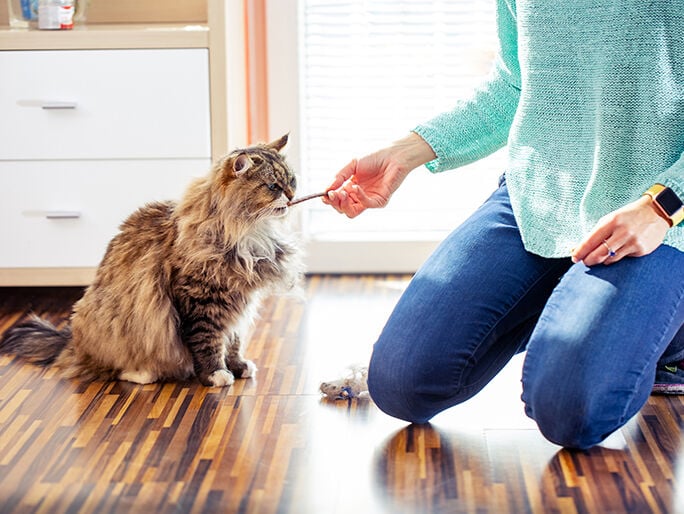

Worried about your pet? Ping Pet Chat™!
Whether it's 3 a.m. or 3 p.m., connect with a real veterinary professional for immediate petcare advice. It's included in all Optimum Wellness Plans®!
Log in to start chattingHow Banfield can help with dog and cat diet and nutrition
What your pet eats can make a big difference to their health! Our vets can perform physical exams, run tests, and help you manage your pet’s food-related issues, including obesity, diabetes, and food allergies.

Get help managing pet food allergies. Do you think your pet’s immune system is reacting to certain ingredients in their food? We can help identify pet food allergies and work with you on management diets.
Does your pet have diabetes? Let’s work together! This includes everything from recommendations on what to feed your pet, how to manage their food and injection schedule, providing appropriate prescriptions, and showing you how to safely perform insulin injections for the pet you love.
We can help your pet reach a healthy weight. We've got advice on diet and exercise for both overweight and underweight pets. Does your pet have a mobility issue that makes it hard for them to exercise? We can help there, too.
 Mites and mange
Mites and mange Podcast - Not Just Fluff
Podcast - Not Just Fluff

